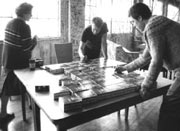ON A SUNDAY afternoon in March, the gray sunlight of the recently awakened sits over Olympia like eyeglasses made of ice cubes. Inside the K Records factorylike headquarters, Calvin Johnson, Heather Lewis, and Bret Lunsford are signing copies of Beat Happening’s soon-to-be-released box set with brand-new Sharpies while quietly sipping coffee and cracking jokes. Someone tells Lunsford that his signature is starting to look less like “Bret” and more like “Butt.” It is as good a time as any to take a break.
“It was yours,” says Johnson, nodding first at Lewis.
“It was yours, Calvin,” says Lewis, passing it back.
“Wasn’t mine. It was Bret’s,” says Johnson.
“I think that, um . . . ,” starts Lunsford, hinting at a fess up, “I like box sets.”
Regardless of who was responsible for the initial idea, Crashing Through collects just about every rudimentary riff, snare drum shake, and flatly affected vocal line the trio has created and adds a thoughtful, memory-ridden chapbook compiled by Lois Maffeo before enclosing the materials in one attractive, yellow-washed package. Beat Happening were pioneers of American lo-fi love pop and flag-wavers of the do-whatcha-wanna-do aesthetic. Poring over Crash-ing Through, it’s difficult to imagine how bands as far and wide as Sleater-Kinney and Belle & Sebastian would have sprouted if not for Beat Happening. The box set includes testimony from folks like Bikini Kill’s Tobi Vail and the Pastels’ Stephen Pastel, photographs and documents from the good old days, and a couple videos (on CD). Not included are weird, posturing dance moves or time travel to a show with the Vaselines, the Screaming Trees, or Fugazi. Also not included: explanations.
Offering one, Lunsford says, “This is the year that we’re all turning 40. We’re all the same age—year of the tiger.”
WHETHER OR NOT it was the creep into older age, the end of a contract with Sub Pop, or just because Lunsford likes box sets, does packaging their collective adulthood feel like a milestone, a birth, a death, a passage? They hem and haw for a few moments, and then, like all good and humble underground legends, they shift the focus off themselves.
“Just recently, I got a copy of the Wipers box set, and it was so inspiring to me,” says Lunsford, referring to the collected work of one of the Northwest’s most woefully underappreciated exports. “These great albums that had so much meaning to me— I mean, you know, the tapes I have of them have slipped back behind the bookshelf; they don’t see too much rotation these days. But to get the songs in this powerful package, with the added tracks and documentation, it just really made that music seem so right for the time.”
“To me, putting out a box set is kind of like a joke or something. It seems kind of audacious,” says Johnson.
Assuming we’re talking about his box set, not the Wipers’, I ask what the difference is.
“The Wipers were good,” he says.
Good, in reference to a band that borrowed instruments for its first shows because its members didn’t have their own, then later helped build a pop empire, is a fairly relative term. And besides, something tells me that Johnson could make a video game out of being evasive.
“Someone invited me to go play a poker game,” says Lunsford, now tangentially addressing the issue of being “good.” “Now, I know some of the rules of poker; I can play some variations of draw poker and stud poker, but it seems intimidating. I mean, to go to a card room and play poker, I’d feel pretty green there.”
“Well, they have that little card in each pack that lists all the poker hands,” offers Johnson. “They’re hard to know. That’s why you have that little card.”
And maybe, taking into account the influence they’ve had on a generation of indie rockers, the anti-punk punk, the break-the-rules rules, and the lazy Sunday afternoon, the only real explanation is that the box set is a lot like that little card.








